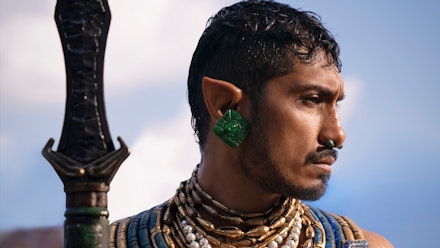For all of its blockbuster bombast and globe-trotting conflict, Black Panther: Wakanda Forever is, in a sense, framed around just one person: Chadwick Boseman. The loss of the Black Panther star, who tragically died in 2020, isn’t just taken as a logistical problem for the franchise to fix. There’s real pain behind this film. In addressing Boseman's passing, returning director/co-writer Ryan Coogler and co-writer Joe Robert Cole movingly and tastefully blur the lines between the real and the fictional.

That loss — of Boseman in real life, and T’Challa within the film — becomes ambient, ever-present. The stages of grief form the trajectory of the film: T'Challa's sister Shuri (Letitia Wright), angry and vengeful, takes refuge in technology, while their mother Ramonda (Angela Bassett), devastated but clear-minded, finds it in spirituality — as though the dual elements of its Afrofuturist setting have been split in two. All of them struggle to continue with their lives. Death, as the characters reminds us, is not the end.
Namor is a highlight, an imaginative adaptation of the veteran comics character, one who here speaks truth with convincing venom.
The tragic circumstances lead to an increased focus on this formerly supporting cast, but the shift feels natural., and there are strong, absorbing performances across the board. In particular, Letitia Wright — stepping up into a leading role — finds compelling volatility for Shuri to take the spotlight. Elsewhere, Winston Duke’s bluster is still a joy to watch; Angela Bassett is commanding and heartbreaking; newcomers like Michaela Coel (as Dora Milaje warrior Aneka) fit in as though they were always there.

Namor, meanwhile (played by Tenoch Huerta, a magnetic presence), makes for a unique antagonist. He's a highlight, an imaginative adaptation of the veteran comics character, one who here speaks truth with convincing venom. Coogler ties him to Mesoamerican history and Spanish colonialism, and there’s a sense — like Wakanda — of a tangible, real-world history. In both Wakanda and Talokan, there is beautiful costuming and production design from Hannah Beachler and Ruth Carter, respectively; and lush photography from cinematographer Autumn Durald, who maintains precision and clarity in the action.
Namor's heritage brings with it some exciting quirks, too: from the wings on his ankles; to more tactile-seeming water effects in place of the usual fireballs; to the use of a hypnotic siren song; to the orcas and whales deployed as battle-mounts. For the most part, Wakanda Forever is imaginative and feels grounded, which makes the tilt to the usual CG-dominated spectacle a little jarring.
In the same sense, the film can feel overly busy. Coogler’s script sometimes strains at having to stuff it all in, from the fallout of T’Challa’s death, to the geopolitical turmoil between Wakanda and Talokan, to the usual extended-universe baggage. It all sprawls into a messy last act that can feel at odds with the rest of the film.
But Wakanda Forever ultimately lands on a poignant note. In bookends, it deals head-on with the passing of both T’Challa and Boseman, moments that pull the film into a moving, surprisingly personal whole. Even in his absence, Boseman holds Black Panther together.








